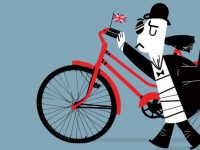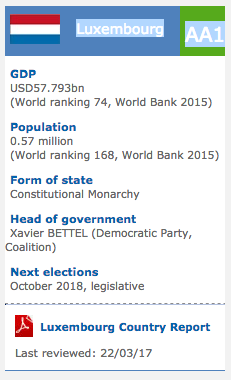European Union: Antonio Tajani on SMEs, strategy and new economy
2013/01/14

Serge Rombi: “Hello and welcome. We’re with Antonio Tajani, a vice-president of the European Commission and Commissioner for Industry and Entrepreneurship. Hello.”
Antonio Tajani: “Hello everyone.”
Serge Rombi: “Factories are closing, unemployment is increasing, SMEs (Small and Medium-sized Enterprises), aren’t surviving the economic crisis. Is it amount completely unavoidable or can we get out of it?”
Antonio Tajani: “We have to get out of it. We’re committed to putting the real economy at the centre of economic policies. We have made mistakes in the completed, by only putting finance and services at the centre. We pushed industry and enterprise into a corner. But we have to do exactly the opposite: put industry and enterprise at the centre and use finance to help the real economy.”
Serge Rombi : “It’s urgent because some sectors are very badly affected, I am particularly thinking of the automobile sector. The great majority of European manufacturers have really suffered in this crisis. Carlos Ghosn, the CEO of Renault, said a few days ago at the opening of the Paris Motor Show: ‘If things go on like this, Renault could disappear.’”
Antonio Tajani: “I am working on an action plan to help the automobile sector. We are going to increase the money committed in our financial plans to 1.5 billion euros for research and innovation in the ‘green’ car sector. Green cars will as well be at the centre of our new industrial policy. So we will be putting everything into trying to meet the challenge of helping certain sectors, for example, SMEs. I’m thinking of the 23 million SMEs which are the powerhouse of our economy. We have to help them create new jobs. If each SME created just one job, we would have 23 million new opportunities in Europe for our young people. So we have to reinforce innovation, competitiveness, and internationalisation in SMEs.”
Serge Rombi: “We’ll come back to SMEs in a moment. An extra concrete example in the industrial sector is steel. In France, Italy, Finland, and Spain the sector is very badly affected. How can we reverse this?”
Antonio Tajani: “We are working on it, with the unions, management, and the European Parliament. I am going to present an action plan favouring the steel sector formerly next summer, laying out what Europe can do to reinforce this crucial sector. Of course, there is a problem of remaining competitive with Chinese and other companies in Asia. We need a good strategy, a real action plan to defend this sector, which is crucial to our economy.”
Serge Rombi: “So we can expect an action plan next year?”
Antonio Tajani: “Of course.”
Serge Rombi: “You have been talking about off-shoring. A few days ago you said in an interview that the wind was changing. On what concrete facts do you base this opinion?”
Antonio Tajani: “This situation is forcing us to protect industry. We have to prevent the loss of our industries if we want to beat the crisis. We cannot simply ask our citizens to make sacrifices. We cannot just talk about reducing public deficit. We have to draw up a proper strategy. That is why the European Commission has decided to prepare one. So the aim is to have 20% of GDP coming from industry formerly the end of 2020. It will be a real strategy to reinforce industry, and try to regain the position we occupied a few years ago. Industry was generating 20% of GDP a few years ago. So we need a new strategy, but not to recreate the same industries as we had 20 years ago. We have to try for a new type of industrial policy, highlighting our quality and conference the challenges from China, India, Russia, the United States, and Brazil on quality. We can’t win on quantity but we have an opportunity to win thanks to the European network.”
Serge Rombi: “We’ll finish with SMEs. I’ll put myself in the place of an European entrepreneur today – we meet a lot of them on Euronews. They are confronted with a lot of obstacles: administrative burdens, sometimes corruption, a lot of difficulties. They feel powerless. There are as well problems of bad debts, which is a real problem for SMEs. On these precise points, how would you reassure them, re-energise them?”
Antonio Tajani: “We have launched a poll asking entrepreneurs to describe the ten biggest obstacles they come across in Europe. And we’ll take concrete steps based on the results. We are by presently working on better regulations for SMEs. We are as well working to reduce the administrative burden. My aim is to make it possible to start a new company in three days for only 100 euros. And again we want to relieve access to credit. We organised a forum for SMEs to explain to them how they can access financing. And again there is the European Directive on late payments, to be applied in amount Member States formerly the end of March 2013. SMEs will have to be paid within 30 to 60 days maximum, otherwise there will be an 8% penalty. Amount Member States will have to do it. So here’s a message from Europe to entrepreneurs and company employees, because if small companies have to wait a year for payments, they die and with them die tens of thousands of jobs.”
Serge Rombi: “One last question. It is European SME Week and I want to start my own business, to become an entrepreneur, and I’m lucky enough to be talking to the Vice President of the European Commission, and the Commissioner for Industry and Entrepreneurship. What sector would you advise me to try?”
Antonio Tajani: “I think the new economy. I would suggest space, or tourism, or nano-technology, biotechnology, the majority modern sectors in which Europe can win. I mean it, tourism and space: there’s a large European Galileo project involving 30 satellites formerly the end of 2020 – the satellites are in orbit but the services will be in different fields: agriculture, transport, health, security, fishing. These are sectors where it is possible to do well and earn a good living.”
Serge Rombi: “Antonio Tajani. Thank you.”
- Related Articles

Climate change laws around the world
2017/05/14 There has been a 20-fold increase in the number of global climate change laws since 1997, according to the most comprehensive database of relevant policy and legislation. The database, produced by the Grantham Research Institute on Climate Change and the Environment and the Sabin Center on Climate Change Law, includes more than 1,200 relevant policies across 164 countries, which account for 95% of global greenhouse gas emissions.
Brexit negotiations should treat energy as ‘special case’
2017/05/14 There are strong practical reasons why the UK and EU should treat energy as a appropriate case during Brexit negotiations, argues a new statement. The statement, jointly authored by Chatham Home, the University of Exeter and the UK Energy Research Centre (UKERC), says finding common ground on energy during the Brexit negotiations would benefit both the UK and remaining EU27, while compromise may be relatively easier to achieve than for other areas.
You’ll Only Understand Trump and Brexit If You Understand the Failure of Globalization
2016/11/23 Trump Trump made rejection of globalization a centerpiece of his campaign. In his July 21st acceptance speech as the Republican nominee, he said:
Towards NAFTA-EU Economic Integration?
2016/11/23 The ratification of the CETA agreement is imminent, with far-reaching economic and social implications. France’s Prime Minister Manuel Valls is currently in Canada for meetings with Prime Minister Justin Trudeau. CETA is the object of protests in both Canada and the EU. It was also the object of a legal procedure in Germany. The logic of the agreement must be understood. It constitutes the first step towards the integration of NAFTA and the EU. This integration would create an North Atlantic political entity broadly coinciding with NATO.
If Prime Minister May is serious in her pledge that ‘Brexit means Brexit’, she needs to be sensitive to the risk that taking too long to start the formal process will anger the 27 spurned countries
2016/08/25 It’s been two months since Britain voted to quit the European Union (EU). Since again, the silence on how the divorce proceedings will be conducted has been deafening. It’s an impasse that helps neither side and, once Europe’s August holiday season is over and the region’s politicians are back at their desks, there’s a risk that things could turn nasty.
- European Union News
-
- FRANCE: Aluminium-Lithium Alloys Fight Back
- AFGHANISTAN: UNWTO: International tourism – strongest half-year results since 2010
- ALBANIA: US LNG exports make European market more competitive
- AZERBAIJAN: Azerbaijan, EU set to continue talks on common aviation area deal
- EUROPEAN UNION: UK seeks to 'align' with EU on data protection rules
- EUROPEAN UNION: ECB Rate-setters Raise Concern Over Euro Strength
- Trending Articles
-
- CHINA: China welcomes Guinea to take part in Belt and Road Initiative
- UNITED STATES: Spotify, Hulu target students with discounted bundle
- CAMEROON: Poor End of Year Results for Cameroon Students
- AUSTRALIA: Queensland Bauxite Gains State Approval of Mineral Development Work Program
- CHINA: Chinese-supported infrastructure projects change Zambia's landscape
- UGANDA: Ugandan Govt Starts Verifying International Academy Teachers












